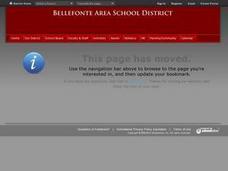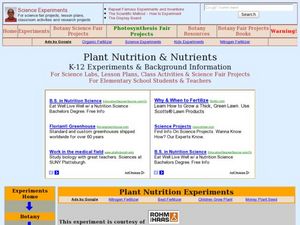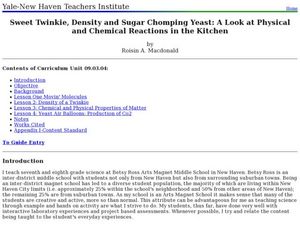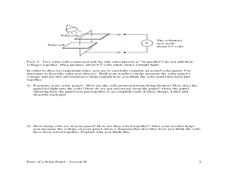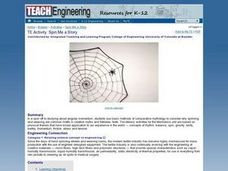Curated OER
Differential Thermal Calorimetry
Students access prior knowledge of infrared rays, ultraviolet rays, gamma rays, x-rays and cosmic waves. In this electromagnetic waves lesson, students hold a mock trial electromagnetic spectrum. Students present characteristics of the...
Curated OER
Particulate Matter
Seventh graders examine the different types of pollutants. In this environmental science instructional activity, 7th graders observe particulate matter under a microscope. They explain how these can affect once health when breathed in...
Curated OER
Pollution Search
First graders identify forms of pollution and describe effects that various pollutants can have on people, wildlife, and plants; students describe relationships between various forms of pollution and human actions.
Curated OER
Chemistry in the Kitchen
Students, in groups, combine given materials from an everyday kitchen until a chemical reaction occurs and record the reaction time.
Curated OER
Tornadoes
Students examine the characteristics of a tornado. They practice using new vocabulary and participate in a question and answer session. They use the internet to gather more specific information.
Curated OER
Water, Water Everywhere (Pond Animals)
Second graders examine the characteristics of animals who live in a pond environment. In groups, they describe the various stages in the life of a frog and identify the characteristics of other pond animals. Using this information,...
Curated OER
The Effects of Storms
An excellent way to review a chapter or unit on storms, this worksheet features vocabulary review (gust, evacuation, storm surge, salinity), concept review (effects and details about hurricanes), skills/process review (normal high tide...
Curated OER
The Amazing Apple
Students analyze an apple. In this lesson about developing inquiry skills, students do an experiment with an apple. Students make several observations about the apple. Students answer questions to help them improve and practice their...
Curated OER
GCSE Module 6 Revision Guide-Chemistry-Oil, Fossil Fuels and Earth's Atmosphere
In this oil, fossil fuels and Earth's atmosphere worksheet, students answer 3 questions about the origin of oil and its uses, the effects of burning oil and fossil fuels on the Earth's atmosphere and the origin and maintenance of the...
Curated OER
Matter, Matter
Students define vocabulary related to the parts of the atom. In this matter lesson, students navigate the web to find the structure and the forces that affect atoms. Students complete an experiment with positive and...
Curated OER
Fieldwork: Horizons Under Ground: Digging Through Wetland Soil
Learners study the different soil types and describe the different soils in various environments. In this soil lesson students walk to a reserve and discuss what they saw.
Curated OER
Plant Nutrition and Nutrients
Students observe seeds growth and examine the different parts of the seedling. In this biology lesson, students compare the growth of seeds planted in soil and in hydroponics. They record their observations in their science journal and...
Curated OER
Sweet Twinkies, Density and Sugar Chomping Yeast: A Look at Physical and Chemical Reactions in the Kitchen
Students investigate matter. In this physical science lesson plan, students will learn about matter, physical states, and reactions. There are a series of four lab activities that will be conducted.
Curated OER
Parts of a Solar Panel-Part II
Students discover how a mini-solar panel is constructed by behaving like detectives. Students examine an actual solar panel, measure the solar panel's voltage and use drawings to describe what they observe before completing questions...
Curated OER
6260 Atoms Test
In these chapter test worksheets students will multiple choice questions on atoms. Students will complete 77 questions on atoms to complete the chapter test.
Curated OER
Alchemists' Theory of the Elements
In this alchemy worksheet, students read about the early thoughts of alchemists regarding elements. Students are given an experiment done by an alchemist during the Middle Ages and they answer three questions about the experiment knowing...
Curated OER
Quick Breads: A Practical Application
Apply food selection and preparation guidelines related to quick breads, rice, grains, and pasta. National Standard 14.3.3 Identify basic cooking techniques related rice, grains, and pasta Identify examples of quick breads: muffins,...
Curated OER
From Bats to Babies: Ultrasound
Students research and analyze sound waves and how an ultrasound works to image a baby in utero. They explore various websites, complete worksheets, and write a paragraph describing a demonstration they view in the classroom.
Curated OER
Spin Me a Story
Students examine the motif of spinning and weaving in myths and folktales. They read various myths, complete a WebQuest, develop a mind map of story elements, and write an original "spider" story.
Curated OER
Tornado!: Types and Formation
Students discuss the different types of tornadoes and how they form. Working in groups, they record journal entries by conducting experiments with water bottles simulating vortex formation.
Curated OER
Aqua-Thrusters!
Students construct their own rocket-powered boat called an "aqua-thruster." These aqua-thrusters will be made from a film canister and will use carbon dioxide gas - produced from a chemical reaction between an antacid tablet and water -...
Curated OER
Robert Boyle and the Mechanical Philosophy
Students read and discuss Boyle's Mechanical Philosophy and his rejection of Aristotle's theory of "Forms and Qualities." They answer a given set of questions and discuss these with the class.
Curated OER
Rock Cycles, Crayon Cycles
Students examine the rock cycle and the path that rocks go through to rearranged in different ways. They define key vocabulary terms, then in small groups conduct a variety of experiments using crayon shavings as simulated rocks and...
Curated OER
States of Matter and Chemical/Physical Changes Stations
Students break into four groups, starting at different stations. Each station should take about 10 minutes depending on prior knowledge of the topic. They then rotate when everyone is finished to the next station and discuss answers of...
Other popular searches
- Properties of Air
- Science Properties of Air
- 4 Air Properties
- Properties of Air Powerpoint
- 5 Properties of Air
- Kindergarten Air Properties
- Air Properties Stations


